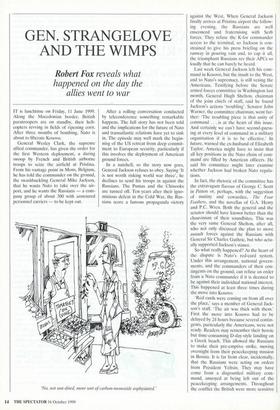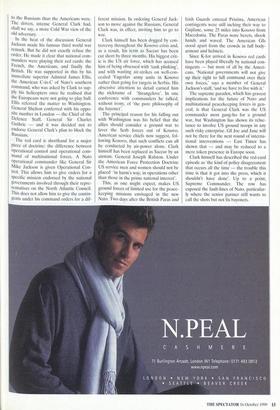GEN. STRANGELOVE AND THE WIMPS
Robert Fox reveals what happened on the day the allies went to war
IT is lunchtime on Friday, 11 June 1999. Along the Macedonian border, British paratroopers are on standby, their heli- copters revving in fields of ripening corn. After three months of bombing, Nato is about to liberate Kosovo.
General Wesley Clark, the supreme allied commander, has given the order for the first Western deployment, a daring swoop by French and British airborne troops to seize the airfield at Pristina. From his vantage point in Mons, Belgium, he has told the commander on the ground, the swashbuckling General Mike Jackson, that he wants Nato to take over the air- port, and he wants the Russians — a com- pany group of about 300 with armoured personnel carriers — to be kept out. After a rolling conversation conducted by teleconference something remarkable happens. The full story has not been told and the implications for the future of Nato and transatlantic relations have yet to sink in. The episode may well mark the begin- ning of the US retreat from deep commit- ment to European security, particularly if this involves the deployment of American ground forces.
In a nutshell, so the story now goes, General Jackson refuses to obey. Saying 'It is not worth risking world war three', he declines to send his troops in against the Russians. The Pumas and the Chinooks are turned off. Ten years after their igno- minious defeat in the Cold War, the Rus- sians score a famous propaganda victory 'No, not sun-dried, more sort of carbon-monoxide asphyxiated.' against the West. When General Jackson finally arrives at Pristina airport the follow- ing evening, the Russians are well ensconced and fraternising with Serb forces. They refuse the K-for commander access to the terminal, so Jackson is con- strained to give his press briefing on the runway in pouring rain and, to cap it all, the triumphant Russians rev their APCs so loudly that he can barely be heard.
Last week General Jackson left his com- mand in Kosovo, but the insult to the West, and to Nato's supremacy, is still vexing the Americans. Testifying before the Senate armed forces committee in Washington last month, General Hugh Shelton, chairman of the joint chiefs of staff, said he found Jackson's actions 'troubling'. Senator John Warner, the committee chairman, went fur- ther: 'The troubling piece is that unity of command ... is at the heart of this issue. And certainly we can't have second-guess- ing at every level of command in a military organisation if it is to be effective.' In future, warned the ex-husband of Elizabeth Taylor, America might have to insist that all key positions in the Nato chain of com- mand are filled by American officers. He said his committee might later examine whether Jackson had broken Nato regula- tions.
In fact, the rhetoric of the committee has the extravagant flavour of George C. Scott in Patton or, perhaps, with the suggestion of mutiny and cowardice, The Four Feathers, and the novellas of G.A. Henty and P.C. Wren. Both the general and the senator should have known better than the chauvinism of their soundbites. This was the very same General Shelton, after all, who not only discussed the plan to move assault forces against the Russians with General Sir Charles Guthrie, but who actu- ally supported Jackson's stance.
So what really happened? At the heart of the dispute is Nato's red-card system. Under this arrangement, national govern- ments, and the commanders of their con- tingents on the ground, can refuse an order from a Nato commander if it is deemed to be against their individual national interest. This happened at least three times during the move into Kosovo.
'Red cards were coming on from all over the place,' says a member of General Jack- son's staff. 'The air was thick with them.' First the move into Kosovo had to be delayed by 24 hours because several contin- gents, particularly the Americans, were not ready. Readers may remember their heroic but time-consuming D-day-style landing on a Greek beach. This allowed the Russians to make their pre-emptive strike, moving overnight from their peacekeeping mission in Bosnia. It is far from clear, incidentally, that the Russians were acting on orders from President Yeltsin. They may have come from a disgruntled military com- mand, annoyed at being left out of the peacekeeping arrangements. Throughout the conflict the British were more sensitive to the Russians than the Americans were. The driven, intense General Clark had, shall we say, a more Cold War view of the old adversary.
In the heat of the discussion General Jackson made his famous third world war remark. But he did not exactly refuse the order. He made it clear that national com- manders were playing their red cards: the French, the Americans, and finally the British. He was supported in this by his Immediate superior Admiral James Ellis, the American C-in-C of Nato's southern command, who was asked by Clark to sup- ply his helicopters once he realised that the Europeans were not going to play ball. Ellis referred the matter to Washington. General Shelton conferred with his oppo- site number in London — the Chief of the Defence Staff, General Sir Charles Guthrie — and it was decided not to endorse General Clark's plan to block the Russians.
The red card is shorthand for a major Piece of doctrine: the difference between Operational control and operational com- mand of multinational forces. A Nato Operational commander like General Sir Mike Jackson is given Operational Con- trol. This allows him to give orders for a specific mission endorsed by the national governments involved through their repre- sentatives on the North Atlantic Council. This does not allow him to give the contin- gents under his command orders for a dif- ferent mission. In ordering General Jack- son to move against the Russians, General Clark was, in effect, inviting him to go to war.
Clark himself has been dogged by con- troversy throughout the Kosovo crisis and, as a result, his term as Saceur has been cut short by three months. His biggest crit- ic is the US air force, which has accused him of being obsessed with 'tank plinking', and with wasting air-strikes on well-con- cealed Yugoslav army units in Kosovo rather than going for targets in Serbia. His obsessive attention to detail earned him the nickname of 'Strangelove'. In one conference with commanders he talked, without irony, of 'the pure philosophy of the bayonet'.
The principal reason for his falling out with Washington was his belief that the allies should consider a ground war to lever the Serb forces out of Kosovo. American service chiefs now suggest, fol- lowing Kosovo, that such conflicts can all be conducted by air-power alone. Clark himself has been replaced as Saceur by an airman, General Joseph Ralston. Under the American Force Protection Doctrine US service men and women should not be placed 'in harm's way, in operations other than those in the prime national interest'.
This, as one might expect, makes US ground forces of limited use for the peace- keeping missions envisaged in the new Nato. Two days after the British Paras and Irish Guards entered Pristina, American contingents were still inching their way to Gnjilane, some 25 miles into Kosovo from Macedonia. The Paras wore berets, shook hands and waved. The American GIs stood apart from the crowds in full body- armour and helmets.
Since K-for arrived in Kosovo red cards have been played liberally by national con- tingents — but most of all by the Ameri- cans. 'National governments will not give up their right to full command over their own forces,' says a member of General Jackson's staff, 'and we have to live with it.'
The supreme paradox, which has gravest implications for the future of Nato and multinational peacekeeping forces in gen- eral, is that General Clark was the US commander most gung-ho for a ground war, but Washington has shown its reluc- tance to involve US ground troops in any such risky enterprise. GI Joe and Jane will not be there for the next round of interna- tional interventions — East Timor has shown that — and may be reduced to a mere token presence in Europe soon.
Clark himself has described the red-card episode as 'the kind of policy disagreement that occurs all the time — the trouble this time is that it got into the press, which it shouldn't have done'. Up to a point, Supreme Commander. The row has exposed the fault-lines of Nato, particular- ly where the senior partner still wants to call the shots but not fix bayonets.



















































































 Previous page
Previous page